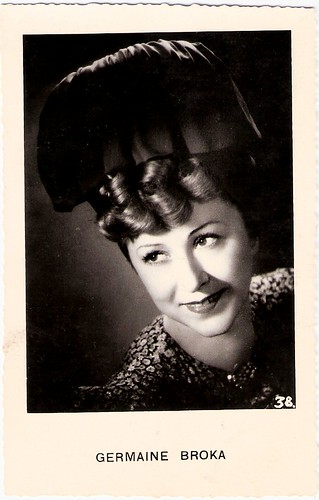
Belgian postcard by P.E. (Photo Édition), no. 38.
Subgenre
Germaine Broka was born in Liège, Belgium, in 1902. At the age of seven, she made her stage debut at the Théâtre du Trocadéro in Liège with her father, Léopold Broka.
She appeared regularly in the local theatres, but at 20, she moved to Brussels to appear in vaudeville. She sang popular chansons like 'J'y vas-t'y'.
In the cinema she appeared mainly in one very popular subgenre, the comedy spoken in the typical dialect of Brussels.
Her first film appearance was in Prince d'une nuit/Prince for One Night (Lambert de Braz, 1936), which was scripted by star Marcel Roels.
Actor and scriptwriter Marcel Roels (1894-1973) was Broka’s longtime companion and he was also the writer of her next film, Zig-zag (Gaston Schoukens, 1939) with Michèle Orly.

Michèle Orly. Belgian postcard by Photo Édition, nr. 106. Photo: Studio Verhassel.
The cheese trade
Germaine Broka played the lead in the comedy Ah! t'Is zo fijn in België te leven/Oh! It's So Good to Be Home (Jacques Loar, E.G. de Meijst, 1950). The film brings together most of the cabaret and music-hall comics of Brussels (Jacques Loar and Lou Darley), Wallonia (Jules de Nemostier) and even of Flanders (Bobbejaan Schoepen).
Director Jacques Loar also made a French-spoken version of this comedy about the cheese trade, Ah! Qu'il fait bon chez nous (Jacques Loar, 1951).
Her last and most successful film was Un soir de joie/A 'Soir' Full of Joy (Gaston Schoukens, 1955). This comedy is based on a true story from November 1943. The Resistance managed to publish a fake edition of the pro-German newspaper Le Soir, full of parodic articles pouring ridicule upon occupying forces. They put it on sale by surprise on the newsstands. The film faithfully traced the course of this humorous and enterprising attempt to wake up the populace, filling out the basic plot with irreverent patriotic gags.
In 1961, Germaine Broka retired. She lived in Laiche with her second husband, orchestra director Gene Dersin.
She had a son with Marcel Roels, William, who worked as an actor and singer. He was also the director for L’Institut national de radiodiffusion (INR), nowadays the public RTBF station. His daughter, Danièle Roels, collaborated on a documentary about her family, Vers des rêves impossibles (Chris Vermorcken).
Sources: Robert Wangermée (Dictionnaire de la chanson en Wallonie et à Bruxelles - French), Wikipedia (French) and IMDb.
This post was last updated on 13 August 2023.
1 comment:
I would love to know what's written here. The characters are fascinating. Anyway, thanks for sharing your comment.
Post a Comment